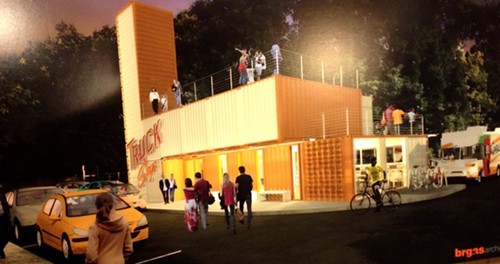Years ago, some anonymous graffiti artist adorned a piece of plywood nailed onto the long-abandoned Tennessee Brewery building with a painting of a snaggle-toothed green monster in a fedora. A thought bubble beside his head reads, “Inve$t in Good Time$!”
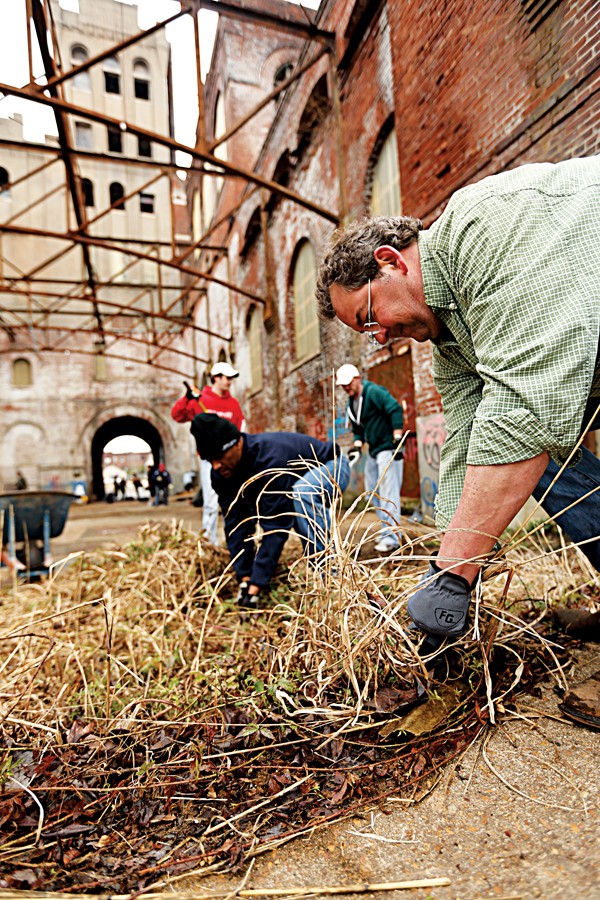 Justin Fox Burks
Justin Fox Burks
Doug Carpenter
The monster has become weathered over the years, with plywood cracks showing through his paint. But a group of enterprising Memphis movers and shakers have taken his message to heart. In an effort to both save the historic Tennessee Brewery from demolition and have a good time in the process, the group is investing their own money and time to put on an event dubbed “Tennessee Brewery Untapped.”
Every Thursday through Sunday from April 24th through June 1st, the courtyard and two inside rooms of the brewery will be converted into a beer garden with local craft brews, food trucks, pop-up retail, live music, and more.
 Justin Fox Burks
Justin Fox Burks
Taylor Berger
Restaurateur Taylor Berger, attorney Michael Tauer, commercial real estate executive Andy Cates, and communications specialist Doug Carpenter are pouring money into this last-ditch effort to save the endangered brewery.
Mayor’s Innovation Delivery Team project managers Tommy Pacello and Abby Miller, who have organized similar pop-up events through the mayor’s office, have been consulting with the team. And Doug Carpenter & Associates public relations specialist Kerry Hayes has contributed ideas and promotion for the event.
Kevin Norman, who owns the brewery under the name Tennessee Brewery LLC, bought the building in an effort to save it back in 1997. But after years of failed deals with potential buyers, Norman has plans to demolish the building by the end of July if no one steps forward to purchase it before then.
“They have a termination clause available for the first six months, and they know they can sell the land after that. There are ongoing expenses with holding this type of building,” says the building’s leasing agent James Rasberry. “That six months has already started, and come the end of July, we will be seeing a demolition crew working on that building. The clock is ticking, no question.”
Enter “Tennessee Brewery Untapped.” The idea behind the free, open-to-the-public pop-up event is to showcase the brewery in a new light and, perhaps, demonstrate the building’s untapped potential. It’s a form of pre-vitalization, a new urbanist tactic exhibiting ways the building could be revitalized before any revitalization efforts are in place.
By holding the event in just the courtyard and two bottom-floor rooms, the event’s sponsors are hoping to show potential investors that revitalizing the building doesn’t have to be a multi-million dollar project.
“Finish the courtyard and the two rooms we’re using, put in some bathrooms, and have some weddings there for a year or two,” says Tauer. “Build up some capital and take on another room, and then we don’t have to lose that beautiful building at the end of the summer.”
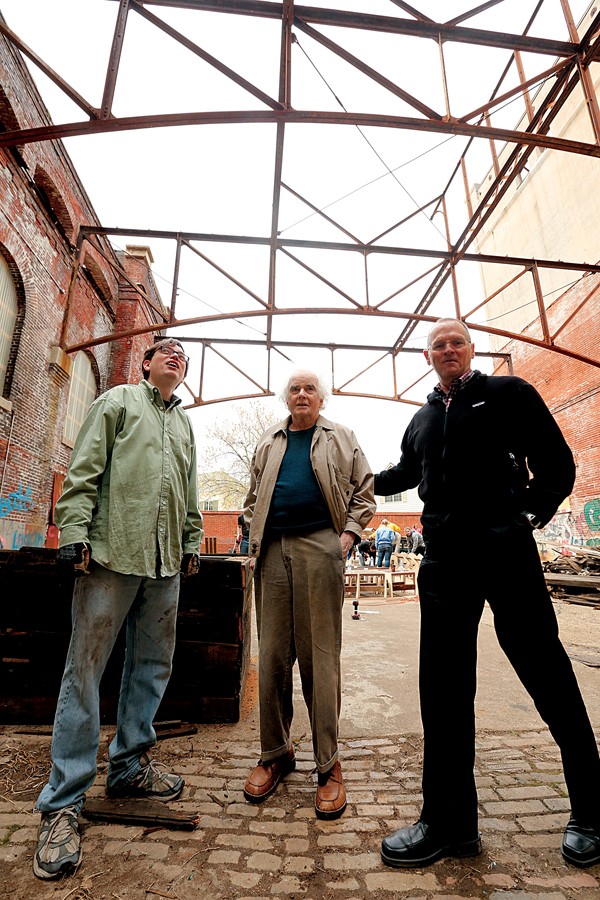 Justin Fox Burks
Justin Fox Burks
helped do layout drawings for the set up of Tennessee Brewery Untapped; Larry Bloch a former owner of the Tennessee Brewery building surveys the progress with James Raspberry
From Brewery to Beer Garden
Up to 250,000 barrels of beer, including the Tennessee Brewing Company’s iconic Goldcrest 51, were brewed at 495 Tennessee Street in the brewery’s heyday at the turn of the 20th century. And beginning Thursday, April 24th, beer will again flow at the old brewery.
In the past couple years, four craft breweries have popped up in Memphis, and all four — Ghost River, Wiseacre, High Cotton, and Memphis Made — will be serving their beers in the beer garden. Twelve taps will feature mostly local beers with a couple of regional offerings.
The beer garden will be open Thursday through Sunday until June 1st. Hours will be from 11 a.m. to 9 p.m. Thursdays and Sundays, with hours extended until 11 p.m. on Fridays and Saturdays.
Each Sunday from noon to 6 p.m., Untapped will host “Beer Garden with Benefits,” and $1 from each beer sale will be refunded back to customers in the form of a token. Those tokens can be placed in one of several buckets representing area nonprofits, such as Project Green Fork, Habitat for Humanity, and Church Health Center, among others. The event’s sponsors will match the nonprofit receiving the most tokens at the end of each Sunday.
Food trucks from Fuel, Stick ‘Em, Rock ‘n’ Dough, and others, will rotate throughout each weekend. Berger and Tauer, partners in the soon-to-open Truck Stop food truck court/restaurant at Cooper and Central, have parked their official Truck Stop truck in the brewery’s courtyard.
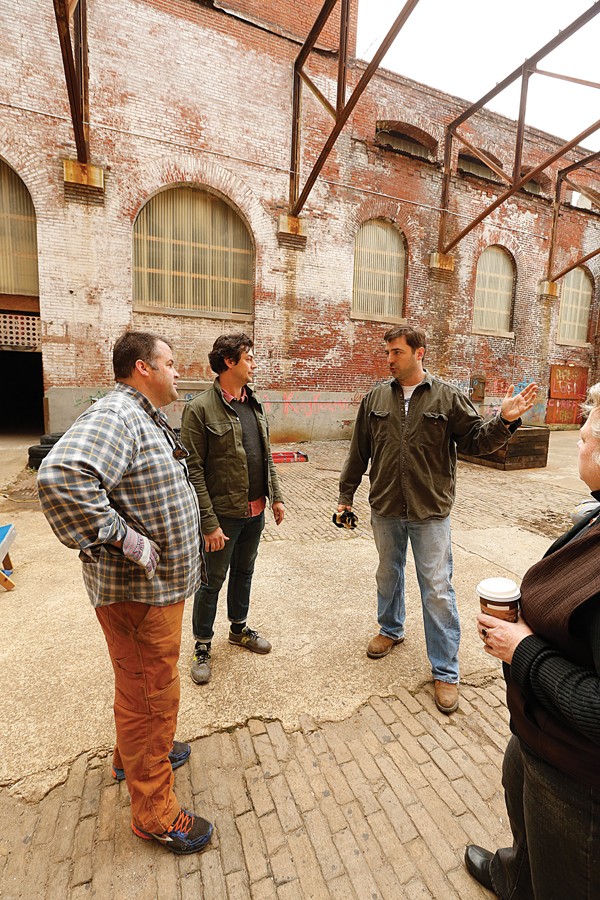 Justin Fox Burks
Justin Fox Burks
Andy Cates, Tommy Pacello, and Michael Tauer
“That will become the kitchen of the Truck Stop when it opens, but for [Untapped], we’re thinking about bringing in some different chefs and trying different types of cuisine,” Tauer says.
There will be pop-up retail from various local vendors, including designer T-shirt shop Sache, which created three shirts promoting the Untapped event, including one that features the aforementioned green monster.
Live music will be limited to acoustic acts, due to requests from residents of the surrounding South Bluffs neighborhood to keep the noise level low. Opening weekend will feature Caleb Sweazy on Friday, April 25th, and Apollo Mighty with Josh Crosby and Jeremy Stanfill of Star & Micey on Saturday, April, 26th, at 8 p.m.
The sponsors are penciling in entertainment schedules from week to week, rather than planning the entire line-up from the start to allow for a more free-flowing organic event.
“We don’t really know what will happen [from week to week], and oddly enough, I find that to be sort of liberating,” says Carpenter.
Neighborhood Concerns
When news first surfaced of the Untapped event about a month ago, a few South Bluffs residents raised concerns about having live music and beer in their usually quiet neighborhood, hence the booking of only acoustic acts.
“The neighbors helped us set the vibe,” says Cates, executive vice-president of brokerage services for Colliers International. “We don’t want people being mad at us for playing drums until 10 p.m.”
Don Hutson, a 20-year South Bluffs resident and the president of the South Bluffs Neighborhood Association, says he believes most residents are now supporting the event.
“We had a few people who were concerned that it would be noisy or there would be problems with them serving food and creating some kind of event we’re not used to,” Hutson says. “But apparently, it’s going to be well-done. And they promised us the music wouldn’t be too loud.”
Deni Reilly, who owns downtown’s Majestic Grille with her husband Patrick, is a South Bluffs resident, and she fully supports the event.
“It’s great that the event is family-friendly so we can wheel our baby over for the acoustic shows,” Reilly says. “We live in the shadow of the brewery, and we’d like to be able to call that beautiful building a neighbor for many years to come.”
South Bluffs neighbors were also initially concerned about parking, especially during the already congested Memphis In May weekends. The sponsors plan to use the grassy lot next to the building for parking on non-Memphis In May days, but since the lot is small, they are encouraging people to bike or trolley to the event.
Much work has been done to convert the littered brewery courtyard into an attractive event space. For four weekends prior to the event, the core group and volunteers from the neighborhood have been cleaning up the courtyard, building tables and a stage from repurposed palettes and reclaimed wood, and creating planters out of old tires to hold plants donated by the Memphis Botanic Garden.
“It’s been affirming that this is an idea people get behind, and it’s also yet another example of what makes this such a great town,” Tauer says. “We put a call out to see who would help us dig out years of dirt and broken glass. They worked their asses off.”
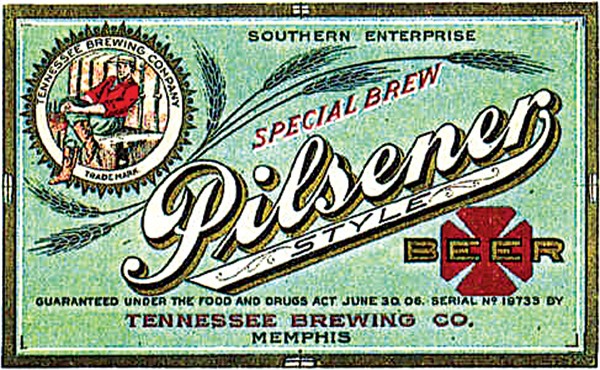
Vintage brewing labels from Tennessee Brewing Co.
Finest Beer You’ve Ever Tasted
Those years of dirt and broken glass tell the story of a time when Memphis was still a young city and apparently home to lots of beer lovers.
On June 2, 1877, the Memphis Brewing Company, at that time run by S. Luehrmann, P. Wahl, and H. Leisse, served the first beer created at what is now known as the Tennessee Brewery, a mammoth Romanesque revival-style building at the corner of Tennessee Street and Butler Avenue.
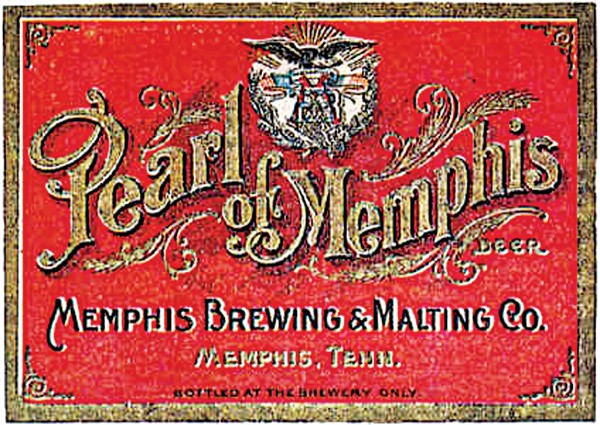
Vintage brewing labels from Tennessee Brewing Co.
In 1885, a group of German immigrants purchased the brewery for $18,000. Those three — John Wolfang Schorr, Caspar Koehler, and Peter Saussenthaler created the successful Goldcrest 51 beer.
Schorr was born in Bavaria and immigrated to the U.S. with his family at age 11. His father was in the brewing business, and he followed in his footsteps.
Schorr and company created lager beer in the Bavarian German style. Their pilsener (spelled “pilsner” today) was widely loved by Memphis beer drinkers in the late 1800s, so they expanded their operation and created other styles of beer. By 1903, the brewery was the largest in the South. In 1906, they introduced their flagship beer: Goldcrest (the “51” was added later for the 51st anniversary of the brewery).
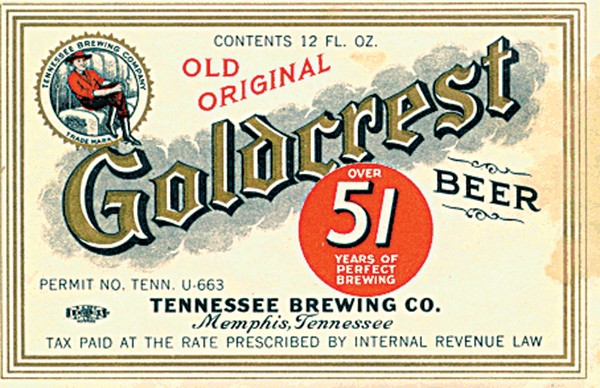
Vintage brewing labels from Tennessee Brewing Co.
Beer memorabilia collector Kenn Flemmons acquired many of the brewery’s original records, which he used to write a book called Finest Beer You’ve Ever Tasted, a history of the brewery. He found the original recipe for Goldcrest beer in those records, and with the help of some micro-brewing friends, Flemmons pared the recipe down and brewed it.
“It was perfectly good directions on how to make 250 barrels of Goldcrest 51 beer. We had to do some research to find the type of hops they used, and we never did find the exact strain of yeast,” says Flemmons, who will be speaking at the Untapped event and signing copies of his book on Saturday, April 26th, at 12:30 and 3:30 p.m. “But it tastes like a typical American lager from the early 1950s.”
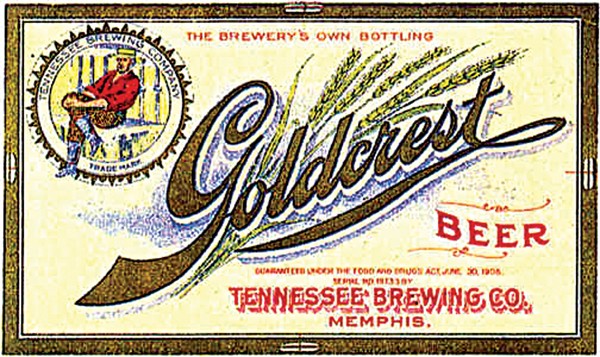
Vintage brewing labels from Tennessee Brewing Co.
Throughout its history, Tennessee Brewing suffered some hard times, especially when Congress passed the 18th Amendment in 1917. The company even went out of business for a time when national Prohibition was the law of the land. Schorr and company attempted to keep the brewery afloat by making a non-alcoholic drink called Nib. But sales plummeted, and the brewery closed in the late 1920s.
Schorr died in 1932, but when Prohibition was repealed in 1933, Schorr’s son Jacob brought the brewery back to life. Business boomed, and the brewery even survived World War II when hops were difficult to come by and other ingredients, such as rice, corn, and yeast, were rationed.
In the end, it was increased competition from big-time beer companies, such as Budweiser and Papst, that eventually killed the Tennessee Brewing Company in 1954.
The brewery’s main building was sold to A. Karchmer and Sons Scrap Metal in 1955, and they occupied the building until 1981. The Tennessee Brewery has remained shuttered ever since.
Sobering Reality
Norman and his family purchased the property in 1999 for $350,000 in an effort to save the neglected building. He poured money into new roofing and stabilized the structure, saving it from demolition.
Since then, plenty of potential buyers have contacted Rasberry, and there have been 14 feasibility studies on potential uses for the building — from condos to a museum to another brewery.
“The [brewery] building is interesting, sexy, and cool, and people are seduced by it initially,” Rasberry says. “That’s been a problem in the past, with regard to actually getting it sold. We have had it under contract numerous times, but it’s very difficult to make the numbers work.”
Rasberry says he’s shown the building at least 500 times to potential buyers.
“I’ve kissed a ton of frogs looking for that princess, and we’re still looking,” he says.
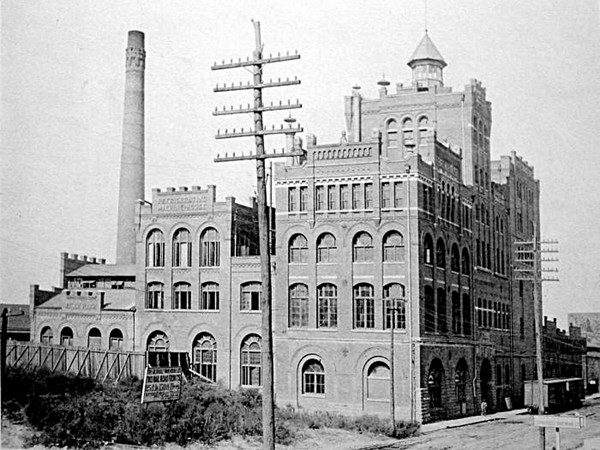
The Tennessee Brewery, circa 1895
But if that princess isn’t found soon, the 130-year-old building may disappear from the Memphis landscape.
Many Memphians have a story about breaking into the building at one point or another. And though most have simply been curiosity-seekers, vandals have done plenty of damage to the aging structure, which makes the cost of renovation even higher.
“People are constantly breaking in, and just replacing a window will cost you $250 to $500. Not to mention that they’ve taken chairs on the new roof and punched holes in the roofing we spent $500,000 on,” Rasberry says.
The building is listed for $1.75 million. But Rasberry says the amount of money a buyer would have to invest to renovate the building and get it up to code is astronomical. If a buyer wanted to renovate the entire building, it would need new elevators for handicap accessibility to all six floors.
The wrought-iron stair railings, often the subject of artsy photographs, would need to be restored or replaced. Rasberry says that might run $200 to $300 a foot. Massive windows on the south side would prove costly to replace.
“There are windows that probably cost $3,000 to $5,000 each. The numbers just go crazy when you calculate what just the glass portion of that building would cost. Those are things that make you go, ‘Wow, how do we make this work?'” Rasberry says.
The Attic
The answer to Rasberry’s question might lie in a “less is more” approach to renovating the building, say the sponsors of Untapped.
While the group organizing the event is sure most Memphians who stop by the event over the next month will be there for “good times,” they’re hoping a few potential buyers might stop in as well. But they’re not specifically targeting uber-wealthy developers with funds to renovate the entire building all at once.
Instead, they’re using Untapped to push what they’re calling “the attic” concept.
“Let’s stop thinking about how you boil the ocean and develop this whole thing at once,” says Hayes of Doug Carpenter & Associates. “Can we see if there are smaller pieces that we can bite off one at a time? Get some people and money flowing and then move on to new pieces. Whether the whole thing gets renovated is kind of irrelevant. This is a new way of thinking about buildings of this size and in this condition.”
They’re hoping a potential buyer will see value in renovating only part of the ground floor — perhaps the courtyard and a few rooms — to use as event space, food truck parking, or some other use that wouldn’t require the entire building rather than the costly renovation that would be required for, say, condos or apartments.
“Those 14 feasibility studies, even when condo prices downtown were going for $200 a foot, weren’t penciling out. If you build out this whole thing, what do you do about parking? That’s a huge cost because you have to build structure parking,” Pacello says. “But if you shrink this thing down and think of it as just a ground floor, you take the need for an elevator out. And that’s a huge cost.”
It’s an idea Rasberry has gotten behind.
“We’ve been discussing just doing the bottom two floors and land-banking the remaining portion, thinking of it more like a two-story house with a large attic. You could use the upper floors for storage space,” Rasberry says.
Since they’re investing their own funds into the Untapped event, Tauer says they’re hoping to turn a bit of a profit. And he hopes that can inspire someone with a vision for a permanent use.
“Preservation doesn’t work unless there’s business rationale. The charitable model of historical preservation isn’t sustainable,” Tauer says. “[We’re hoping] this type of project shows someone out there who can invest significant resources that you don’t have to think of this as a $10 million project. If you can throw a couple hundred thousand dollars into it, think of what you can do based on what we’ve done.”
If Untapped is successful, Cates believes it can be a model for saving other endangered historic properties in Memphis.
“As long as Memphis doesn’t run out of abandoned buildings, you can take this concept somewhere else,” Cates says. “There are so many different things you can do. It doesn’t always have to be a beer garden.”
Memphis Heritage executive director June West agrees. After the news of the brewery’s impending demolition broke a few months ago, Memphis Heritage called a meeting, and this “attic” idea was floated.
“Use what you can and make it work. And that doesn’t mean some marvelous thing won’t happen [with the rest of the building] later,” West says. “There may come a day when you can go past the second floor. I think that’s a really important step for looking at a lot of buildings in Memphis.”
This idea of previtalization isn’t new to Memphis, though it may be the first time its been tried in a single building. The Mayor’s Innovation Delivery Team’s MemFIX events — neighborhood festivals with pop-up shops in unused and abandoned spaces in Crosstown and South Memphis — have already helped to enliven those neighborhoods.
The long-empty row of Crosstown Shoppes on Cleveland served as pop-up shops during the first MemFIX event in November 2012, and today, all of those formerly empty spaces have been filled with art studios, galleries, a hula-hooping studio, and the Hi-Tone music club. With Untapped, the organizers are transferring that idea to a single building.
Whether or not Untapped is the saving grace for the Tennessee Brewery, its organizers are at least glad they’re trying.
Carpenter says, “Our perspective is, if they’re going to tear it down, let’s enjoy it while it’s still here.”
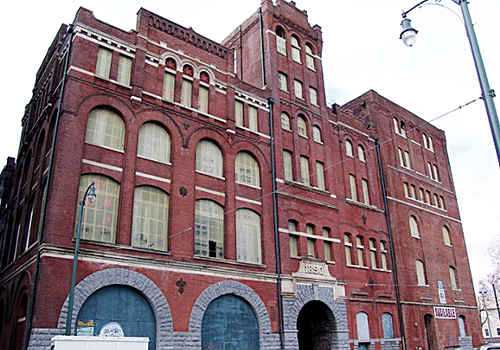
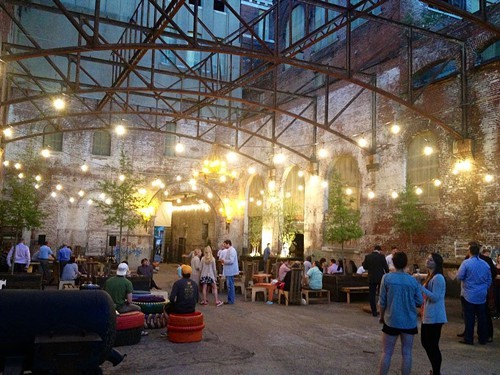
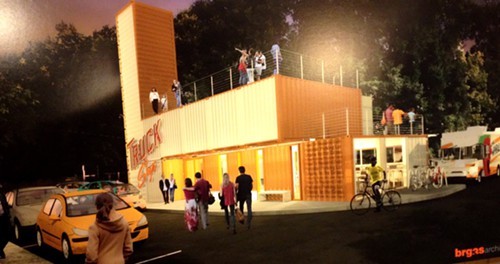
 Justin Fox Burks
Justin Fox Burks  Justin Fox Burks
Justin Fox Burks  Justin Fox Burks
Justin Fox Burks  Justin Fox Burks
Justin Fox Burks 




